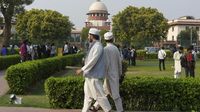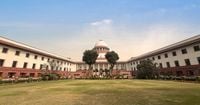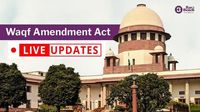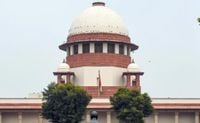The Supreme Court of India is currently deliberating on a series of petitions that challenge the constitutional validity of the Waqf (Amendment) Act, 2025. This legislation, which amends the Waqf Act of 1995, aims to regulate Waqf properties—religious endowments dedicated for charitable purposes under Islamic law. However, the amendment has sparked significant controversy, leading to over 70 petitions from various stakeholders, including Members of Parliament, religious organizations, and political parties.
Petitioners argue that the amendment discriminates against Muslims and interferes with their religious affairs. They contend that the changes undermine the autonomy of the Muslim community in managing their Waqf properties. On the other hand, six states ruled by the Bhartiya Janata Party (BJP) have come forward to support the amendment, asserting that it is necessary for better management and transparency of Waqf properties.
During the proceedings on April 16, 2025, a three-judge bench led by Chief Justice of India Sanjiv Khanna, alongside Justices P.V. Sanjay Kumar and K.V. Viswanathan, indicated that it might consider imposing a stay on certain key provisions of the amendment. Solicitor General Tushar Mehta, representing the Union government, requested additional time to file a preliminary response, emphasizing the complexity of the issues at hand.
Chief Justice Khanna noted, "We had said there were some positive things in the law. We have stated that there cannot be a complete stay. But we also don't want the situation to change which is prevailing now..." This statement reflects the court's cautious approach as it navigates the legal and social implications of the amendment.
One of the primary concerns raised by the Supreme Court is the status of properties previously recognized as Waqf by user, which could potentially be de-notified under the new amendment. The court expressed that such a move could have "grave ramifications," particularly for properties that have been long established as Waqf. The bench stated, "When a legislation is passed, courts generally do not interfere. If property declared waqf by user is denotified, it can have grave ramifications." This highlights the delicate balance the court must strike between legislative authority and judicial oversight.
Another contentious point is the inclusion of non-Muslims in the Central Waqf Council and Waqf Boards. The Supreme Court has questioned whether it is appropriate for non-Muslims to hold majority positions in these bodies, which are fundamentally concerned with Islamic endowments. Chief Justice Khanna pointedly asked, "Whenever it comes to Hindu endowments, do you allow Muslims to be members of these bodies? Say it openly." This inquiry underscores the broader implications of the amendment on the religious rights of Muslims in India.
In addition to these issues, the court has scrutinized the powers granted to collectors in deciding disputes over Waqf properties. The bench raised concerns about the fairness of barring properties from being considered Waqf during ongoing inquiries, stating, "The moment the collector starts inquiry and even when he has not decided yet, you say that it cannot be treated as waqf... What purpose will be served by this proviso?" This statement reflects the court's commitment to safeguarding the rights of Waqf properties during administrative processes.
The Waqf (Amendment) Act, 2025 was passed by Parliament on April 4, 2025, after extensive debates. It received the assent of President Droupadi Murmu the following day. The legislation has been criticized for expanding the Union's control over Waqf properties and for potentially reducing the Muslim community's religious autonomy. Critics argue that the amendments are designed to diminish the status of Muslims, effectively relegating them to “second-class citizens.”
As the Supreme Court continues to hear these petitions, the Union government has assured that it will refrain from denotifying any properties previously declared as Waqf until the next hearing on May 5, 2025. Solicitor General Mehta confirmed that no appointments would be made to the Central Waqf Council or the State Waqf Boards during this interim period.
In the context of these developments, the Supreme Court has also expressed concern over recent violence in West Bengal linked to the amendments. Chief Justice Khanna remarked, "One thing is very disturbing is the violence that is taking place. If the matter is pending here it should not happen." This highlights the potential for social unrest surrounding the legislation and the court's role in mitigating such conflicts.
The Waqf (Amendment) Act has ignited a fierce debate about the intersection of religion and governance in India. As the Supreme Court prepares for its next hearing, the outcome will likely have far-reaching implications not only for Waqf properties but also for the broader discourse on religious freedoms and minority rights in the country.
In summary, the Supreme Court's deliberations on the Waqf (Amendment) Act, 2025, encapsulate a critical moment in India's legal landscape, where the rights of a religious community, the authority of the state, and the principles of justice must be carefully balanced. The court's decisions in the coming weeks will undoubtedly shape the future of Waqf management and the rights of Muslims in India.







